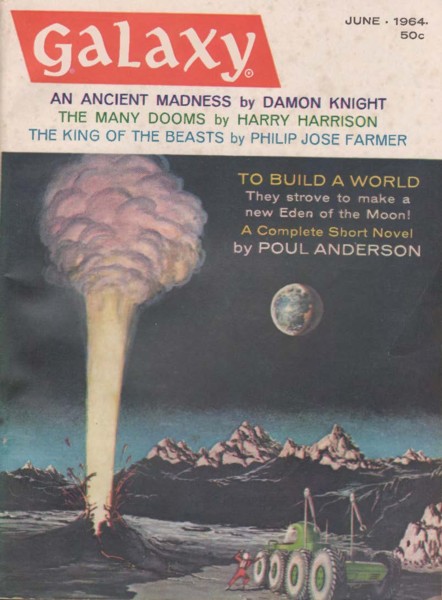
Warning: This is all discussion, or all spoiler. You can find a PDF of the original publication here.
So earlier this year, I found a comment on the brief "King of the Beasts" by Philip José Farmer, asking what the theme was. I think the theme was implicit in comments.
I still stand behind my initial assessment although I didn't give it its full due. After the first reread, I added this comment:
But I reread it several more times, pondering. At first I felt it should have been longer, perhaps characterizing better, but then the punchline loses its punch."The King of the Beasts" is #17 on this blog's most popular posts. That suggests that the story has more impact on readers than one might have supposed. Time permitting, I will need to revise it. It has more relevance than the tone may have implied.
The theme deals with how, as a consequence of allowing so many species to become endangered. humanity itself might become one of its own victims. Potent, surely.
Then I finally decided to examine it, line by line, to see what worked, what didn't. These lines were especially effective:
Passenger pigeons strutted. A rhinoceros trotted like a dainty battleship.
The strutting or arrogance of a species that had been wiped out--much like humanity within this tale. The next line was even more potent: there's nothing dainty about a rhinoceros or a battleship and it serves as an effective contrast.
One thing I originally listed as a problem--hiding the identity of the characters as aliens (to us)--may or may not be. The only way we can enjoy the surprise ending--humans are the extinct species resuscitated!--is by hiding physical details that we would have known were we there. A cheat.
On the other hand, what if the story assumes we are one of the aliens and can observe humanity from the outside? On the other other hand, wouldn't we be unlikely to make the visitor's shocked comment?
The one thing that I dislike about the story isn't the common misanthropic punchline, but that shocked comment:
“Then it must be...But you wouldn’t dare!”
Some may feel it's necessary, but we're being fed what our reaction should be. After all, in the far future, would humanity be more likely be forgotten, seen as a foolish mistake, or seen as a terror unleashed upon the universe? While the above suggests part of one problem, the dialogue also limits some of the tale's thematic potential.
What is the source of the misanthropy? Nuclear war? Certainly that would have been at the backs of many minds when this was published (note the aforementioned battleship). Our destruction of species? That may be here with the passenger pigeon although many here were not extinct and endangered species at the time of writing. Perhaps it is a combination of sins.
"King of the Beasts" is a great title, which suggests that humanity is nothing more than a beast like the rest of the animal kingdom and this little vignette might have focused more tightly on that.
If we consider ourselves as just one of the animal kingdom, it's interesting that such a theme arises when it arises. The literary past has plenty of precedent for respecting animals (the Bible, native American legends), but if we see ourselves as animals before we considered ourselves as insulated and safe from wild animals, one suspects that this now common misanthropic conclusion in the modern world, would have seemed incongruous in an earlier time. Of course, we would have seen our kind as dangerous, but imagine complete annihilation? Probably not.
While many would have been saddened at the passing of a species, would it have been seen as the accidental victim of "progress"--an idea we cling to this day? This is not an agreement with such an interpretation, but merely a SF'nal thought, exiting our own perspectives to see our perspective again. It's a claret, a palate cleanser. Perhaps one day, our children will see our modernity through yet another lens.

No comments:
Post a Comment